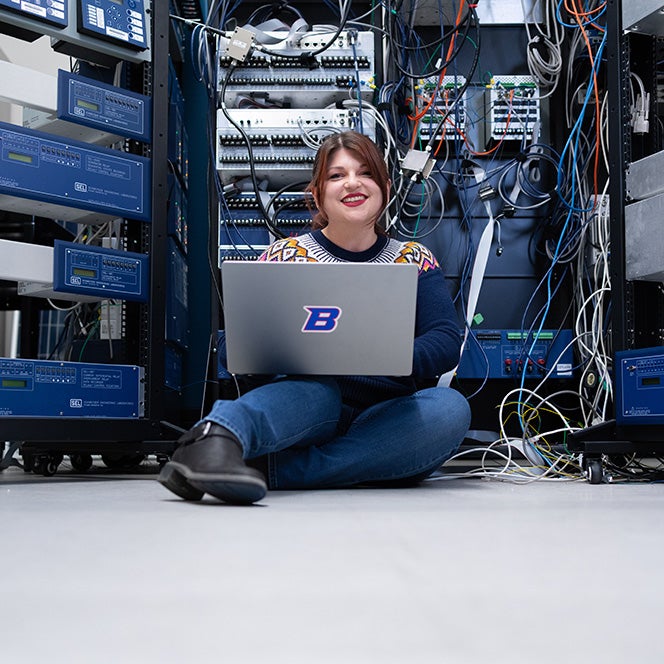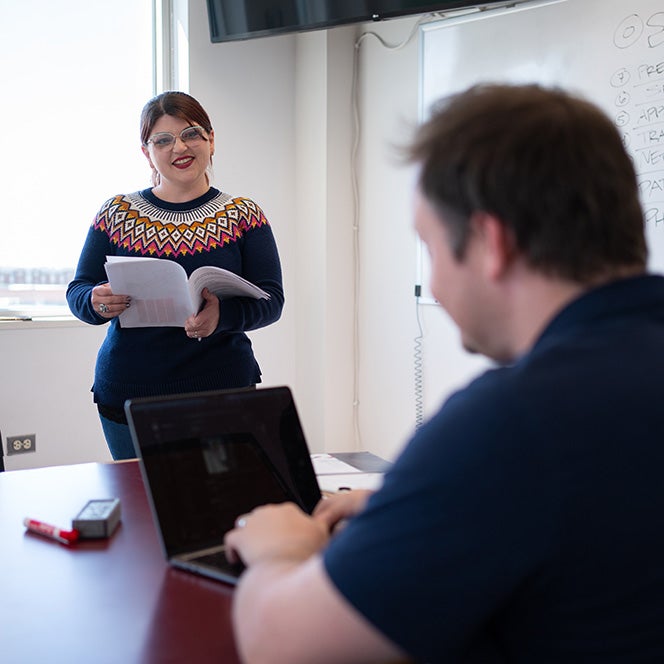
Boise State University’s online cyber operations and resilience program attracts its fair share of students with backgrounds in the military, law enforcement and information technology, but is designed to be just as accessible for those with non-technical backgrounds.
An Arizona native, Ashley Furr worked in customer service before making a pivot toward a new career in cybersecurity after witnessing one too many violations of consumer trust. “I was watching people get scammed all day, every day, and I couldn’t take it anymore,” she said.
“I wanted to try to be a part of the solution, to be a shield.”
Soft skills like empathy and a growth mindset can take you just as far as technical knowledge in the world of cybersecurity.
Welcome to the Cyberdome
Furr began her cybersecurity journey by pursuing an associate degree in Applied Science in Cybersecurity at the College of Western Idaho, which she completed in May of 2023. During her time with the program, she received additional support by interning at the Cyberdome, which is a collaborative hub that helps prepare students for the workforce while serving its roster of clients throughout Idaho, including in rural communities.

She enjoyed her time there and the self-assurance it helped instill in her, saying, “The knowledge sharing is very beneficial to confidence building, especially in this field.”
Furthering her education
Furr officially became a Bronco after transferring to Boise State’s online Bachelor of Applied Science in Cyber Operations and Resilience program in the fall of 2024.
Within the program, she’s furthering her education and career prospects by learning how to approach organizational resiliency holistically while applying industry-standard fundamentals of cyber operations and making ethics-based decisions. These are all key elements of the program, which aims to build resilience by teaching its students to problem-solve using a more well-rounded perspective.
“It’s definitely more of a thinking degree. We learn a lot about how people, processes and technology work together to form resilience at its core,” said Furr.
The emphasis on thought processes described above also helps smooth the intimidating barrier to entry that more math- or code-focused curricula can cause for prospective students. This is another reason why soft skills are prioritized over strictly technical ones when it comes to finding success within the program.

“The cyber operations and resilience program really helps hone skills that a lot of students already have,” Furr added.
Future-problem solving
As for her future goals, Furr looks forward to completing her degree in December 2025 and pursuing a career in cybersecurity, especially one that allows her to fulfill her original goal of helping others protect themselves online through education.
“I enjoy teaching people how to best secure themselves by educating them with patience and kindness. People aren’t dumb. Not even close. They’re just uninformed or misinformed and threat actors are sneaky. Attacks — mainly social engineering — are getting cheaper and easier to execute every day,” she said.
She also wants to be at the forefront of where the digital age is heading.
“Everything’s moving more and more digital — because that’s where the new frontier is moving — so why not try to jump into the field and try to protect those digital assets and those resources,” Furr adds. “With that, I’m looking at roles in governance, risk and compliance , cyber insurance, risk assessments, risk awareness training or public education and outreach.”
Learn more about the cyber operations and resilience program
Boise State’s online cyber operations and resilience program can open doors to new opportunities and a brighter future — and we’re here to support you every step of the way. Whether you’re exploring if an online program is right for you or need help transferring credits, connecting with a student success coach is the perfect first step.
Ready to learn more? Attend one of our online information sessions or contact a student success coach today.